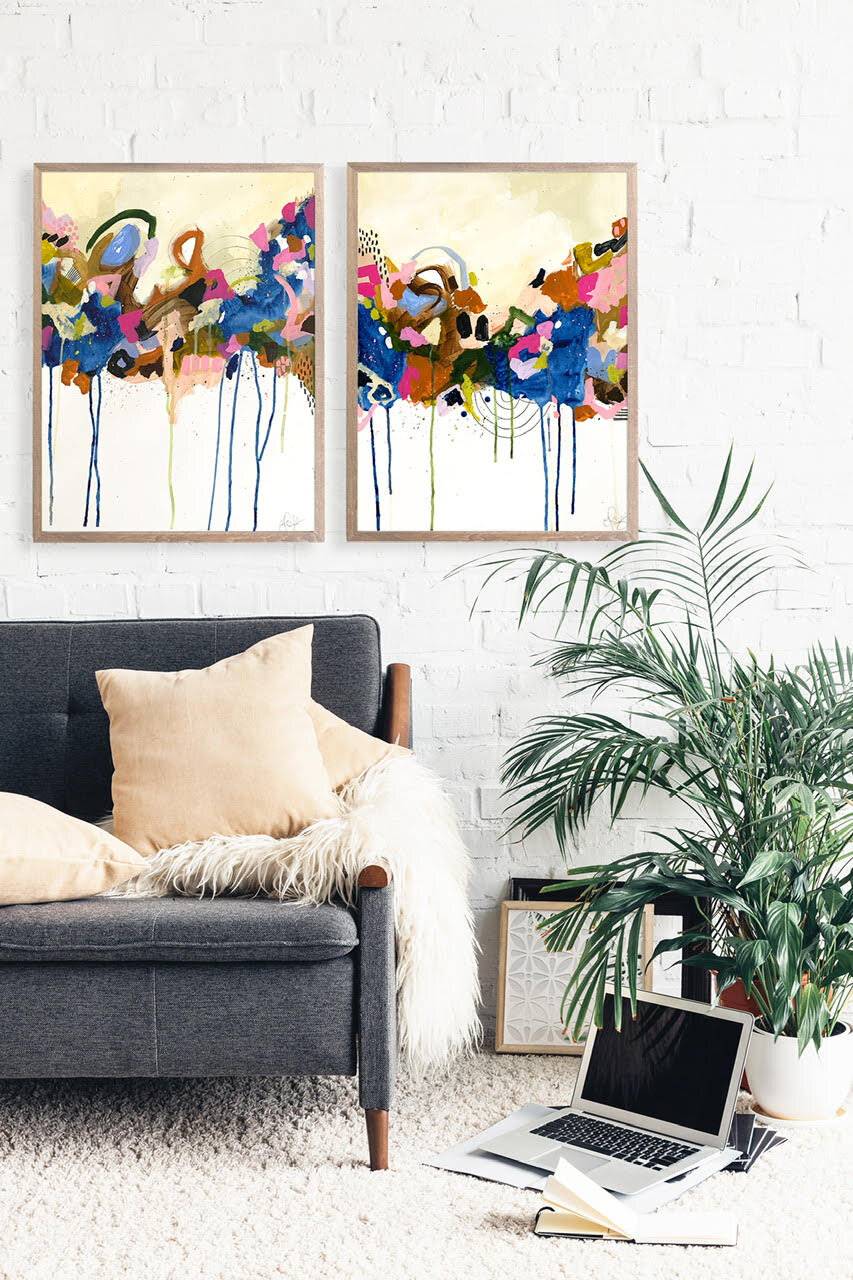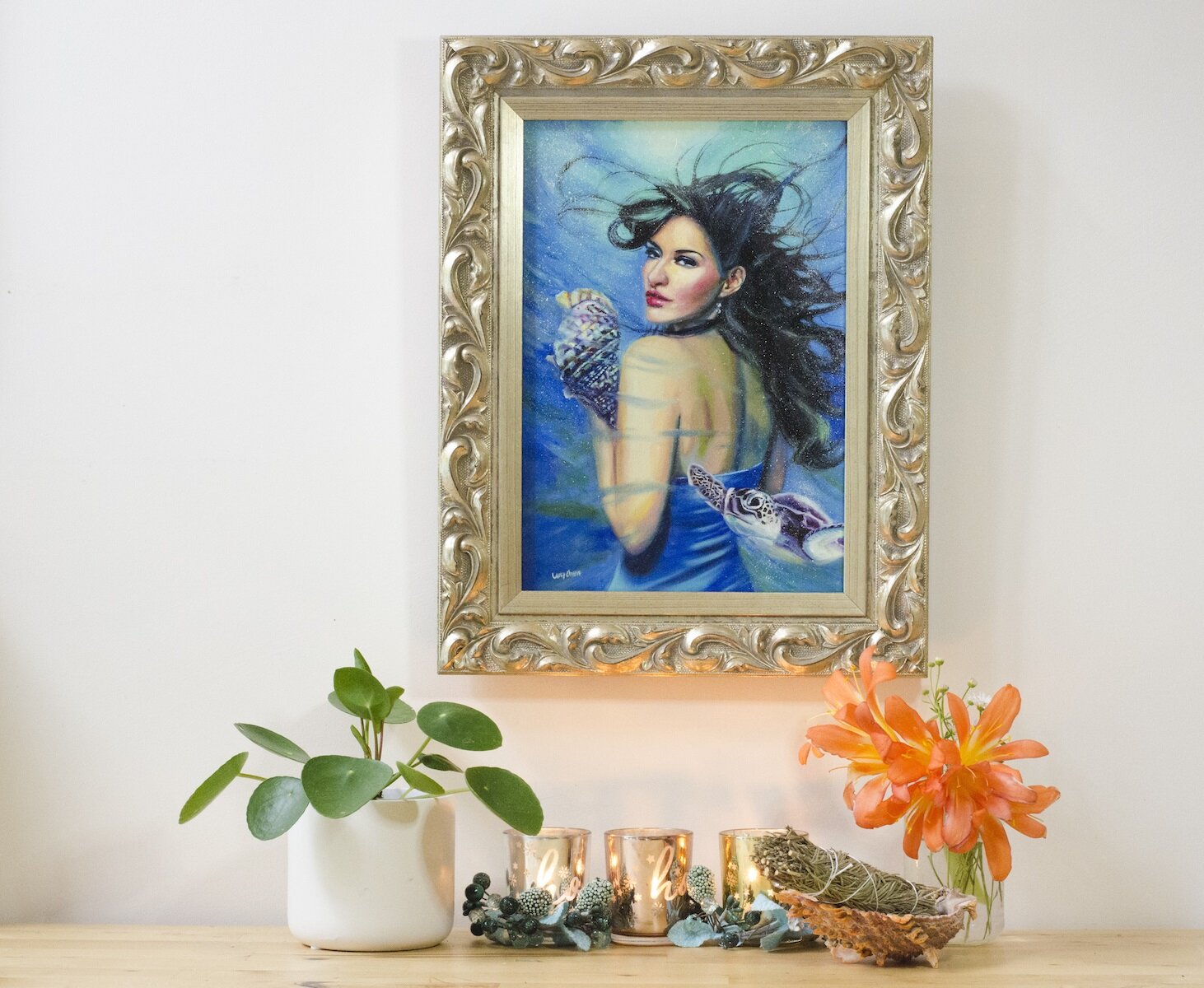How to Incorporate Art into Your Home
Published January 8, 2020 - By Ryan Smith
Courtesy of REDFIN
www.redfin.com/blog/how-to-incorporate-art-into-your-home/
Artform Fine Art, among others, was recently invited to share its thoughts on selecting and placing art in the home.
Adding art to your interior can be an excellent way to elevate the feel of a room. Depending on which piece you display, you can change the character of a space and create an aesthetic that is uniquely yours.
Now, the location and context of your art can play a huge role in how it affects any given room. And unfortunately, if you’re like most of us, you don’t know much about either art or interior design. That’s why we’ve rounded up artists from California to Pennsylvania to offer their best tips on how to choose the right piece and effectively incorporate it into your home. Below, you’ll find masters of the craft explaining the science behind art, often using their own work as an example. Read on and enjoy this collection of unique work and expert tips!
Ken Berman, Ken Berman Art: “As an artist and collector I think of art as a friend that greets me every day. Sometimes it just makes me smile … sometimes it is profound and talks to me about bigger life issues … sometimes it captures my imagination when I find hidden gems in the work that I didn’t catch before. No matter what location or decor, the art you collect should trigger your emotions and intellect and inspire you to be a better person every day.”
Eric Armusik: A well-styled home depends heavily on strong and meaningful pieces of art. Most of my collectors use my work as the impetus behind a design that enhances the look and feel of the room – a window into the owner’s soul. Art speaks volumes about a person, so the work they choose to enhance and beautify their home should also reflect their personality and interests.
Mary Ann Cohen, MAC Art Galleries: The most important element in making art selections for your home is to choose works that speak to you personally, emotionally and that you intuitively know will feed your soul for years to come. Just don’t get too caught up with it matching your decor because bold & unexpected choices will make your home more striking. It sounds like a tall order and it is, but the best way to start is to find the right source who can guide you through the process and make the collecting part exciting & fun!
Viviana Elinger, Toi Gallery: At Toi we believe that art is the soul of a home. Think about what mood you’d like to transmit, what colors present that mood, what combination of shapes and sizes emphasize the feeling you are looking for. For the living room, credenzas are the perfect piece of furniture to combine with an art wall. Playing with contrasting colors is always an interesting choice, or go for the same color palette for a more subtle feeling. Choose the art you love, and the rest will follow!
Patti Mollica: Choosing an Art Style? You can either use art to add a splash of contrast with your home decor, or accentuate it by using a similar style… or both! For example, our home is very contemporary/modern. Lots of floor to ceiling windows and straight angles. Our furniture is also modern with clean lines and neutral earthy colors. My choice for art is to paint with more brilliant colors that contrast against the neutral palette, and interpret my subject using angular, geometric lines and shapes – which mimics and enhances our decor style. The sample below shows a recent painting I created with these specific style parameters in mind – to both contrast AND accentuate our current home decor.
Laura Fedorowicz: “Think of your home as moments and as an energy space and decide what emotion or feeling you would like to have in each “moment” around your house. Choose artwork that not only fits your color scheme but invokes that particular feeling for you, as art selection is deeply personal. When you fill your home with art that not only matches your personal aesthetic, but also uplifts and inspires you, your home becomes an extension of your heart.”
Wayne R. Moran, Wayne Moran Photography: “If your house is your castle, it should be filled with art that you are passionate about – art you have experienced and explored yourself. What better way to do than then to display art of places you have traveled to? Just imagine the unique and beautiful feel of your house being decorated by the images from your once in a lifetime trip to France and Italy. That way, the art on your walls will always remind you of the great joy you experienced in these amazing trips.”
Aaron Reed, Aaron Reed Photography: “Nature photography, when presented in an abstract form can create the appearance of movement or fluidity either alone, or in bringing multiple visual elements together. Often having a look similar to a painting or sculpture, abstract photography is almost like two mediums of art in one space. In smaller sizes, the impact is often reduced or sometimes even lost on the viewer but in larger pieces, abstract nature photography is one of the most thought-provoking and visually stunning ways to show fine art in your home or office. This type of natural art affords each person who sees it the opportunity to interpret and ingest the work on a personal level, providing a new connection to each individual who enters. In the same way that color can provide contrast, the lines, shapes, and fluidity of abstract art can provide contrast to the often hard-edged elements of furniture and natural surfaces in your home.”
Tony DelSignore, DelSignore Photography: “Photography is and has always been about capturing a moment in time. When choosing a photograph to hang in your home, make it about how it makes feel you as much as anything. Whether you have traveled to the destination in the photograph, or dream to travel there one day, it should evoke a sense of adventure or fond memories for you. Let the photograph be the statement in that room and put it in a place that allows you and your guests to experience that moment as if you were there.”
Jessica Paindiris, The Clarion List: “It is very important to hire expert art installation companies when hanging fine art in your home. A professional installer will ensure your art is not damaged during the process and is properly secured to the wall, and they can suggest the best wall position so it’s not too high or too low. The Clarion List is a free online resource for finding local art installation companies.”
Amitai Sasson, OverstockArt.com: Get real, hand-painted art – if you can’t afford originals go for the best next thing which are hand-painted reproductions. That way you can have a hand-painted Monet or Van Gogh custom framed and ready to hang without breaking the bank.
Susan Melrath: “First, invest in one significant piece for a large wall space, such as over a sofa, or a bed. This could be a large-scale horizontal piece, a diptych, triptych, or a grouping of smaller works. Keep the spacing between these pieces consistent. Choose a piece of art that is the same length as the furniture or a little smaller. Second, select art that resonates with you, or evokes a sense of wonder. Let your soul do the choosing. Go with art that inspires you in some way, or makes an emotional connection. A good way to get started is to create a folder or Pinterest board of your favorites. You may start to see a common thread that gives you a sense of things you are consistently drawn to.”
Ken Kaminesky Photography, Discovery Photo Tours: “Make the artwork something that will be a conversation starter and have a story to go along with it. Art should be something that stirs your soul and causes people to stop and go…WOW. The artwork should speak to you but also say something about who you are or what your dreams are.”
Carla Bisong, Bisong Art Gallery: “Art does not have to match the couch. If a work of art moves you, buy it. The biggest mistake I see in homes are paintings being displayed too high on the wall. The middle of the painting should be at eye level.”
Lucy Chen, Lucy Chen Fine Art: “Choose artwork that fits YOU, that is meaningful to you, instead of trying to match art to your home decor.”
Michael Rose, Michael Rose Fine Art: “The key to getting the most out of art in your home is to acquire work that you’re passionate about. Whether you buy work to support a friend who is an artist or find items by artists you admire in an auction or consignment setting, collecting works you love is the best investment you can make. And don’t be intimidated because industry professionals like gallerists, auctioneers, and independent advisors can help you out along the way, too!”
Martin Osner, Martin Osner Fine Art Photography: “Simplicity feels airy and light and can be revisited over and over. It offers a welcome break from the busyness of life and a breath of fresh air. Less is undoubted
Jane Davies, Jane Davies Art Gallery: “Toss a lot of the “rules” out the window. Old style homes with traditional rooms can have abstract/modern art pieces; modern rooms look great with classical pieces. Don’t buy what you like, buy what you love, pieces that are personal to you, and make you feel emotion. Consider art for rooms that don’t often get it: the kitchen and the bath. Scale should be a loose guideline; as long as you have the wall space a small room can take a bold piece. Don’t match it with your decor; a blue room does not need blue art. Lastly, don’t search for art online by color; you’ll only see pieces that they artist/gallery tagged with that particular color and you may miss out on pieces you’d otherwise fall in love with.”
Kevin Silas, Art Insurance Now: First and foremost, buy art that you love, something that speaks to you and brings you joy to look at. Next, choose a space and lighting to display it. Whether using picture lights or recessed spotlights, this is an important factor to take into account. Use warm dimmable light bulbs and try to avoid direct sunlight, as it can cause fading.
Kristina Kaiser, The Yards Collective: “Here at The Yards Collective we rotate exhibitions about every two weeks, that’s a lot of art that comes through our doors! When collecting pieces for a home I suggest buyers select pieces that deeply resonate with them and can be timeless. Sure it’s nice to pick a piece that will go above your blue chevron sofa, but art is an investment and you need to think of it that way! I suggest buyers pick pieces that will complement a collection instead of just one room.” Photo below by Christian Rivera.
Rita Tantillo, Artform Fine Art: “Selecting art for your home is a very personal experience. A painting or sculpture should speak to you on an emotional level. Art should provoke a feeling, a longing, a memory, which will be reflected in your décor, making it truly “your home.” If you appreciate art of different movements and styles, perhaps contemporary and traditional, you can easily hang both by creating an environment where the styles stand on their own, yet do not compete. A small grouping of beautiful landscapes juxtaposed against a large contemporary modern painting on an adjoining wall, make a beautiful statement. And when it comes to color palette, neither the art nor the décor should individually vie for attention. The artwork and the furnishings should convey a cohesive story. In some cases, a neutral color palette can highlight the artwork and in other instances, complementary colors may offset it, allowing notice of the furnishings.”
Deeann Rieves, Deeann Rieves Art: “Original art can turn an ordinary room into a sophisticated home that tells your story. The colors and movement in an abstract painting can set the tone for a playful and vibrant kitchen or a calm and sophisticated master bedroom suite. You can get lost in the peaceful movement, reflect in the subtle layers, and let the delicate lines guide you through the abstract forms in endless patterns as you appreciate the artwork for years to come.”
Jaime DeGroot, DeGroot Fine Art: “When hanging artwork, a room’s natural lighting is an important element that’s visually complementary; it enhances fine details and illuminates the piece. However, the UV rays in sunlight cause damage over time. It is best to keep artwork out of direct sunlight and consult with a professional on archival framing materials to help protect your collection for years to come.” The artwork below is courtesy of Scott Wolniak and Volume Gallery.
Jacqueline Kamin, Bright Light Fine Art: “Art is an intimate conversation with the viewer, and is a very personal decision based on taste and even as an investment. Therefore, in order to incorporate a piece of art into your home, it is important to think about how you feel, what touches you, and your long-term vision. You shouldn’t base art on color, but instead based on your style (i.e., contemporary, traditional, modern, abstract impressionist, etc.), especially since the piece of art will be with you forever, well beyond your home.” The image below is courtesy of David Leffel.
About Ryan Smith
Ryan is on the marketing team at Redfin and loves writing data-driven articles about all things real estate. Ryan's dream home would be a Cape Cod-style house near the ocean and the mountains.





















